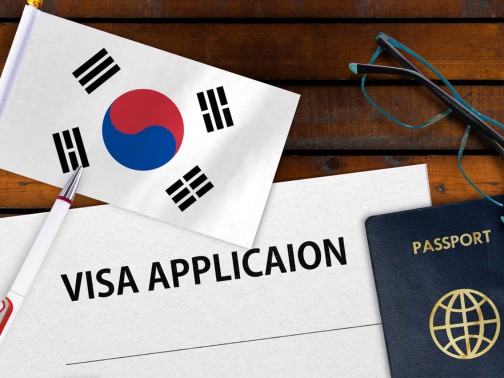Contents
Toggle
Meet David De’ Ath, founder, editor, and writer at Wonderful World English. With his extensive background as an English teacher, David provides valuable insights and practical tips on ESL for students and teachers alike.
Embarking on the adventure of teaching English in South Korea offers a unique opportunity to immerse oneself in a dynamic culture while contributing to students’ educational journeys.
To secure a teaching position, it is essential to understand the basic requirements mandated by the Korean government and educational institutions.
Candidates need a 4-year college degree and a TEFL certificate and must pass thorough health and criminal background checks to qualify for an E-2 teaching visa.
Once the primary requirements are met, exploring the vast array of teaching opportunities becomes the next step.
Positions can range from public schools and international schools to private academies and universities, each setting offering its own experiences.
Navigating the application process requires attentiveness to detail in preparing documents, such as degree certificates and sealed transcripts, which will be rigorously examined during the visa application process.
After successfully securing a position, adapting to life in South Korea is a multifaceted experience requiring an open mind to embrace local customs, language nuances, and societal norms.
Settling in may pose challenges, but it can be met with resilience and an eagerness to learn, paving the way for a rewarding teaching stint full of personal and professional growth.
Key Takeaways
- Meeting educational and legal requirements is pivotal for teaching in South Korea.
- A variety of teaching environments are available for different preferences and experiences.
- Successful adaptation to Korean culture enhances the overall teaching experience.
Understanding the Requirements
To teach English in South Korea, it is crucial to meet specific requirements, which include educational qualifications, teaching certifications, and legal documentation.
Adhering to these criteria ensures eligibility for legal teaching positions.
Basic Eligibility Criteria
Native English Speaker: Candidates must be native English speakers, typically from recognized English-speaking countries such as the USA, UK, Canada, Australia, New Zealand, Ireland, or South Africa.
Bachelor’s Degree: A four-year bachelor’s degree from an accredited university is a prerequisite for aspiring teachers.
This degree is essential, regardless of the major, for participation in the teaching programs and for the visa application process.
Credentials and Certifications
TEFL Certification: Securing a TEFL certificate is often required, demonstrating the candidate has received training in teaching English as a foreign language.
Some employers might prefer candidates with a TEFL certification of at least 100 hours.
For a complete guide on TEFL certificates and how you can get your hands on one, check out the link below!
Related: TEFL Certificates: Your Guide to Teaching English Abroad
Legal and Documentation Needs
Background Check: A clean national-level background check is mandatory, signifying no criminal history.
E-2 Visa: To legally teach English, one must acquire an E-2 teaching visa, which requires submission of necessary documents, including one’s degree certification and a clean health certificate.
Applicants must not have any record of drug use or serious health issues.

Exploring Teaching Opportunities
When aspiring to teach English in Korea, one must consider the types of institutions available, such as public schools or private academies, the distinctive nature of university roles, and the various programs that facilitate the application process.
Public vs Private Institutions
In Korea, English teaching opportunities are divided between public institutions and private academies, known as hagwons.
Public schools often employ foreign teachers through government programs like EPIK (English Program in Korea).
These are typically well-structured positions with set working hours and a variety of benefits.
Applicants must have a TEFL certification and a bachelor’s degree.
In contrast, private schools or hagwons offer more variable working schedules and may present opportunities for higher earnings, but can also demand more teaching hours.
The choice between the two often depends on one’s preference for stability or flexibility and possibly one’s desired location within Korea.
Teaching Positions in Universities
Teaching positions in universities in Korea are seen as prestigious and highly competitive.
A master’s degree and several years of teaching experience are usually required.
These roles involve teaching and may include responsibilities like curriculum development and administrative duties.
The benefits are good, often including generous vacation time and reduced teaching hours compared to public and private schools.
Applying Through Programs
For those who prefer a more guided approach, applying through official programs like EPIK or TaLK (Teach and Learn in Korea) can be advantageous, especially for newcomers without teaching experience.
These programs offer structured contracts, pre-arrival training, and support throughout the visa process and living in Korea.
Alternatively, numerous recruiters specialize in placing teachers in both public and private institutions across Korea, which can streamline the job search and application process for potential English teachers.
Another popular East Asian country for teaching English is Japan!
Check out the guide below to find out more!
Related: How to Teach English in Japan

Application Process
The application process for teaching English in Korea is multi-faceted, involving the preparation of documents like resumes and cover letters, understanding the best times to apply, and engaging with recruiters. Thorough knowledge of each step is essential for success.
Application Timeline
One must take note of key hiring periods, which typically begin in March and September.
Candidates should start preparing their application materials at least a few months in advance.
Initially, this includes a well-crafted resume and cover letter tailored to English teaching jobs.
Following an offer, the visa application process requires significant time; hence, early preparation is advised.
- Initial Preparation (4-5 months prior): Resume and Cover Letter drafting.
- Job Application (3-4 months prior): Submit applications to schools or recruiters.
- Post-Offer (2-3 months prior): Visa processing and document submission.
Interview Tips
Interviews for English teaching positions can be conducted via phone or video calls.
It’s important to demonstrate enthusiasm for teaching and a respectful understanding of Korean culture.
One should provide specific examples of teaching strategies and experience.
- Preparation: Research common interview questions and practice responses.
- Conduct: Dress formally and ensure a quiet, clean background for video interviews.
- Follow-up: Send a thank-you email reiterating your interest in the position.
Working with Recruiters
Many applicants find success working with a recruiter specializing in placing English teachers in Korean schools.
Recruiters can provide invaluable assistance with navigating the application process, including advice on the interview and refinement of application documents.
They serve as the intermediary between the applicant and potential employers.
Selecting a reputable recruiter and clearly communicating one’s preferences and qualifications is crucial.

Settling in South Korea
When moving to South Korea to teach English, understanding the financial and housing aspects of settling in is crucial.
One must be attentive to details regarding salary prospects, housing provisions, and the overall cost of living to establish a solid foundation.
Understanding Salaries and Benefits
English teachers in South Korea typically earn a salary between 2.1 million to 2.8 million Korean Won monthly, which roughly translates to $1,500 to $2,200, depending on their teaching experience, qualifications, and whether they opt for public or private school positions.
Benefits attached to teaching positions can include health insurance, paid vacation, and sometimes even flight reimbursement to cover travel costs.
Furthermore, additional bonuses may be available for teachers who are tasked with working at multiple schools.
Accommodation and Living Costs
Accommodation in South Korea varies, with many employers providing furnished housing or a housing stipend.
Teachers may receive free housing, which significantly decreases their cost of living and allows for a comfortable lifestyle.
Utilities are usually the teacher’s responsibility, but they are generally affordable.
For reference, accurate and up-to-date information about living expenses can be found on platforms like Numbeo, which offers detailed statistics on costs ranging from rent to transportation.
Considering the attractive salary and benefits package teachers receive in South Korea, it’s important to have a clear budget to manage expenditures effectively.

Adapting to Korean Culture
When teaching English in Korea, educators must immerse themselves in Korean culture, which includes understanding language nuances, social practices, and lifestyle elements.
Korean co-teachers can serve as cultural interpreters, which enriches the teaching experience and helps teachers navigate daily life.
Cultural Insights
Acclimating to Korean Culture demands a sense of respect for its deep history and traditions.
An instructor ought to visit Buddhist Temples, participate in local festivals, and understand Korea’s hierarchical society, where age and position often dictate the level of formality in interactions.
Engaging with Korea’s rich heritage helps teachers build rapport with students and colleagues.
China is another East Asian country that is a highly popular destination among ESL teachers.
Check out the guide below to find out more!
Related: How to Become an English Teacher in China
Language and Communication
Whilst English is the subject matter, learning the Korean language plays an integral role in communication, especially outside the classroom.
Fluency isn’t required immediately, but knowing basic greetings and phrases can significantly alter one’s teaching and living experience.
Non-verbal cues are equally important; one should be observant and adapt to indirect styles of communication that are prevalent in Korean society.
Lifestyle and Social Aspects
Teachers will find that Korean food strongly anchors the social fabric, with meals often shared amongst friends and co-workers.
From Kimchi to Bibimbap, it’s essential to try a variety of dishes and embrace local dining etiquette.
Entertainment facets, including K-Pop and traditional arts, are recreational and formative in understanding the modern Korean psyche and engaging with students.
Public transportation in Korea is reliable and extensive, making it easy for teachers to explore and connect with their surroundings.
Incorporating these cultural elements with an open mind will greatly enhance an English teacher’s experience in Korea.

Conclusion
Pursuing a career as an English teacher in Korea offers a remarkable and enriching experience.
To embark on this journey, it’s essential to possess the appropriate qualifications and meet the necessary criteria.
With the growing demand for ESL teachers in Korea, numerous opportunities await those eager to explore life in this vibrant country.
To increase your chances of securing a teaching position, ensure you have all the required documentation and thoroughly prepare for your interviews.
The effort you put into these initial steps can significantly influence your success.
Once in Korea, embrace the experience wholeheartedly.
Engage with your students and the community, and make the most of this unique opportunity to create a positive impact.
Teaching in Korea isn’t just about imparting knowledge; it’s about cultural exchange, personal growth, and forming lasting connections.
We hope this guide has given you a clearer understanding of what it takes to become an English teacher in Korea and inspires you to take the following steps in this exciting career path.
Feel free to reach out if you require any support.
Have a wonderful day!
Image Attribution: All images licensed via canva.com





